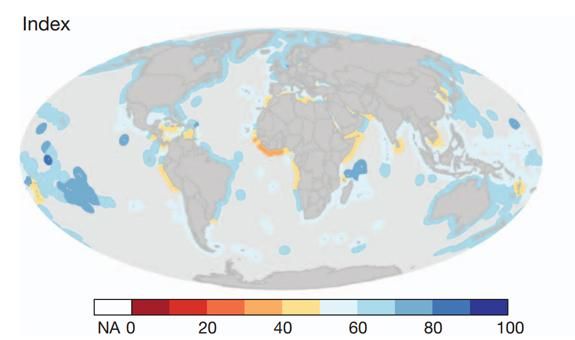Frantic Search Ensues for Planet-Sized Dunce Cap as World’s Oceans Take Home Report Card
The “ocean health index” was just released, and overall the world got a giant “D”
/https://tf-cmsv2-smithsonianmag-media.s3.amazonaws.com/filer/2012081604000808_16_2012_ocean-index.jpg)
As students across the country prepare to go back to school, and parents bob and weave through hectic ‘Back-to-School Sale’ aisles, the world’s oceans have just been handed a comprehensive report card after being graded on ten different subjects by an international team of researchers.
The ocean health index, says Nature, uses scores for biodiversity, tourism value, coastal protection, and how effectively a body of water is used for producing food, among others aspects, and pools them into an over-arching grade for each country—a representation of how well each nation is managing their coastlines.
Overall, the world got a 60 out of 100. If this were a classroom, an overbearing educator not wanting their school to look like they were slipping behind might bump up the class average. Unfortunately, in this case, the fixes cannot be doled out willy nilly.
One of the study‘s authors, Karen McLeod, looks at it differently. She told Nature,
This should not be considered a failing grade for the oceans… The real value of the index will be the ability to track progress related to management policies over time.

The highest scoring nation, says The Guardian, is a tiny uninhabited island in the the Pacific Ocean, which got an 86. War-ravaged western Africa bottoms out the list, while the continental United States sits somewhere in the middle with a 63. Allie Wilkinson in Ars Technica:
To an extent, the index quantifies what we already knew: human activities such as overfishing, coastal development, and pollution have already taken their toll, altering marine ecosystems and the services they provide now, and for future generations.
National Geographic points out that the index is not a test of the ocean’s natural purity or some other similar notion. Rather, it tests whether the water’s resources are being used in the most sustainable way. For instance, “there are two ways a country can score poorly on fisheries: either by overfishing or by not fishing them as much as could be sustainably supported.”
Like study author McLeod, Wilkinson sees the potential future for the report card.
This index can be a powerful tool to raise public awareness, direct resource management, improve policy, and direct scientific research. By demonstrating how ocean issues fit into a broader context, the index opens the dialogue about how to use or protect the oceans.
More from Smithsonian.com:
Ocean Acidity Rivals Climate Change As Environmental Threat
Q and A: Jane Lubchenco - The marine ecologist and administrator of the National Oceanic Atmospheric Administration discusses restoring the bounty of the world’s oceans
/https://tf-cmsv2-smithsonianmag-media.s3.amazonaws.com/accounts/headshot/smartnews-colin-schultz-240.jpg)
/https://tf-cmsv2-smithsonianmag-media.s3.amazonaws.com/accounts/headshot/smartnews-colin-schultz-240.jpg)